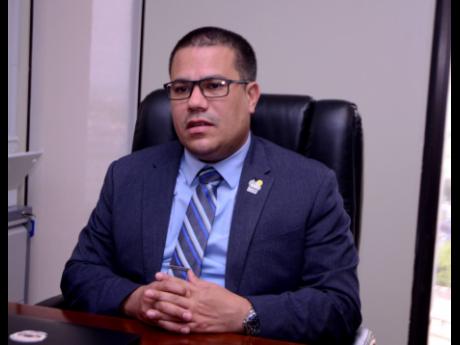Samuda says no to water harvesting law
NWC to continue supply restrictions
Senator Matthew Samuda has poured cold water on calls for Government to mandate water harvesting to address the crisis brought on by the yearly drought season.
While acknowledging that water harvesting will play a “critical role” in building Jamaica’s water resilience, the minister, at a post-Cabinet press briefing on Wednesday, says passing legislation to make this compulsory is not the answer.
Instead, he shared that the country is nearing completion of water-harvesting guidelines, which will be gazetted and will provide instructions to planning authorities and developers alike.
“We expect those guidelines to be completed within the next 30 to 60 days and then the appropriate sensitisation to be done with all of our planning officers,” said Samuda, who is minister without portfolio in the Ministry of Economic Growth and Job Creation with responsibility for water.
According to Samuda, issues such as water harvesting have always been viewed in the context of a housing crisis in Jamaica and “anything that you insist upon that increases the cost of housing, there has always been a general sensitivity to the space”.
Section 61 (a) of the Building Act 2018 stipulates that buildings should make provisions for water harvesting. However, the regulations that would allow for its enforcement are still not in place.
“We have to ensure that every Jamaican household is undertaking water harvesting,” Opposition Spokesperson on Land, Environment and Climate Change Sophia Frazer-Binns told The Gleaner in a recent interview. Her suggestion was supported by head of the Incorporated Masterbuilders Association of Jamaica, Lenworth Kelly.
Frazer-Binns also lamented that the drought conditions were being compounded by climate change.
But while acknowledging the impact of climate change on the drought season, Samuda shared that Government intends to lead the charge of water harvesting through its public buildings, in areas where there is no National Water Commission (NWC) footprint, and will also be encouraging citizens to make water harvesting a habit.
Meanwhile, Evan Thompson, director of the Meteorological Service Jamaica, disclosed that the country received consistently low levels of rainfall from October to February, resulting in a severe drought situation.
“We saw that this was probably cumulatively the amount of rainfall that was the lowest that we had ever seen Jamaica as far as our record indicated,” he said.
And although there was some rebounding in March when the country received 84 millimetres of rainfall, just four millimetres shy of the expected amount, he said the country is still experiencing a drought.
“It doesn’t mean that our drought is broken. It will take a lot more rainfall to ensure that we break the drought pattern because we have to look over a period of eight weeks before we make a determination of whether we are still experiencing drought,” he said.
Because of this, Mark Barnett, president of the NWC, said the agency’s water-supply restrictions are likely to continue into May.
“The restrictions will not be lifted unless we are comfortably seeing improved inflows into our reservoir storages that are comfortable levels. So for the rest of the month, and even further into May, the restrictions will still be in effect,” he said.
Barnett outlined that recent rainfall has increased water storage to 40.8 per cent at the Hermitage Dam and 43 per cent capacity at the Mona Reservoir.
But he also shared concerns about the impact of the drought on the NWC’s finances, stating that the agency has spent almost $400 million to truck water to affected areas.
“It simply means expenditures like those would have been chopped from other work that we need to do,” he said, adding that their network has also been experiencing more leaks and is more susceptible to theft because of the drought.
“It is not uncommon when you have a system with intermittent supply, which is what we have now, for there to be an increased amount of breakage, leaks. So with drought, you actually are at a higher risk of more leaks, and certainly, there is the probability of more theft,” he said. “That’s just the reality of the situation.”

